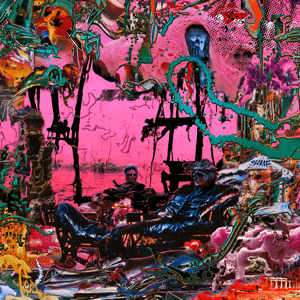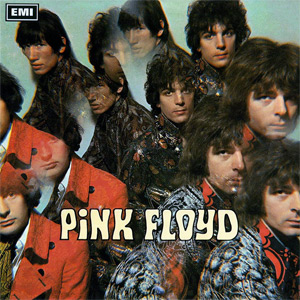Squid are back with their 3rd LP, Cowards. Following on from their excellent 2023 record, O Monolith, Cowards delves deeper into the band's more experimental and post-rock tendencies. The whole album revolves around the central theme of evil, and while Olly Judge's lyrics and vocal approach regularly dipped into manic and unhinged territory on their past material, the themes and narratives of these songs are way more upfront and explicit.
The opening cut Crispy Skin, for example, is quite obviously from the perspective of a cannibal who is having a moral crisis over their actions, flitting between questioning their decisions and a sort of psychosis where their brain is trying to force them to forget that they actually have done that. Musically, it feels like a bridge between the more wiry post-punk grooves of the debut (Bright Green Field) and the linear Krautrockian song progressions from O Monolith. Blood on the Boulders is this creeping post-rock slow burn and is much more stark and simple than anything Squid usually creates. The track has a hot desert-ish atmosphere that compliments the cultish lyrics detailing a murder under the California sun and the obsessiveness of true crime fanatics wanting to know every last detail. The track slowly unravels from this slow and plodding pace into a typical noisy Squid climax, with the contrast really paying off. Fieldworks II similarly has the atmosphere of a slasher flick, referencing broken bones and wiping blood from ones face against a backdrop of chiming guitars and cinematic strings. The closing line "I don't look in the lake." is particularly chilling.
The other tracks in the first leg of the record aren't quite as interesting, which leaves it feeling a little lopsided. Building 650 is essentially a musical retelling of the Japanese crime novel In the Miso Soup, which is about a serial killer, with none of the deeper commentary or weirdness that other moments on the record have. The track is also musically the most bog-standard Squid. It's not bad (there are definitely songs off BGF that are weaker), but it lacks the unique bells and whistles that most Squid songs have. Fieldworks I acts more as an interlude at the mid-point of the record than as a lead into Fieldworks II but also doesn't really stand on its own, so does just feel a bit odd and unfinished.
The second half of the record is where it really gets into its groove, starting with Cro-Magnon Man. Similarly to Building 650, it's stylistically quite classic Squid, but the weird as hell lyrics about the odd-ball, vintage horror film-esque titular character and frenetic keyboards really draw me in. The title track is a slow jazzy post-rock piece that reminds me of a cross between Kid A era Radiohead and the quieter moments on Black Country, New Road's debut. Showtime! really is the albums piece de resistance, going through multiple phases - starting as a erratic, scratchy post-punk track before moving into an expansive space rock section that then settles into a driving krautrock finale. The closer, Well Met (Fingers Through The Fence) is drawn out and patient, building up the tension through its claustrophobic first half which is then let out in the spacious and ascending second half.
Cowards is another good (and sometimes great) album from Squid. It's not quite as consistent as O Monolith and I think I prefer the quite alien and otherworldly atmosphere of that record to the more gritty and down to earth approach taken to the songwriting here. It's still very inventive and engaging and well worth checking out if you like this kind of neurotic experimental rock.
Top Tracks: Crispy Skin, Blood on the Boulders, Fieldworks II, Cro-Magnon Man, Showtime!, Well Met (Fingers Through The Fence)
7/10




.jpg)

